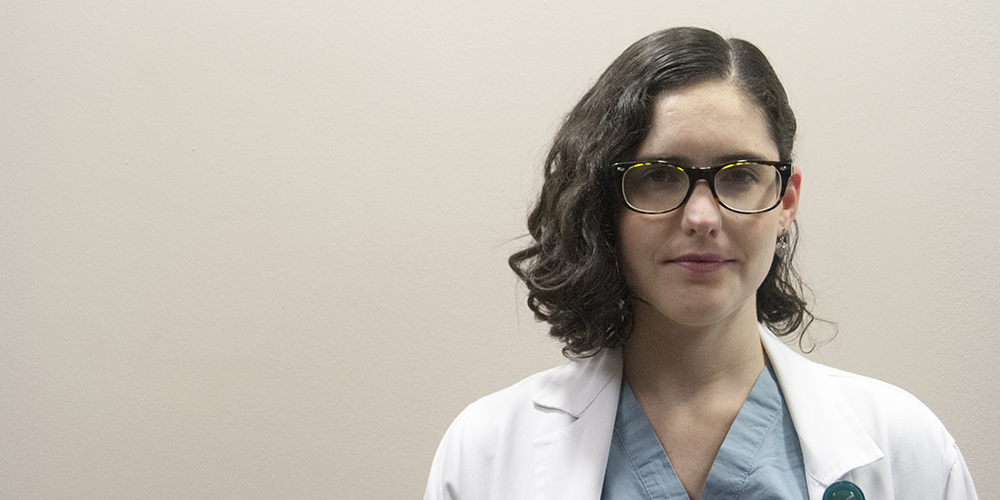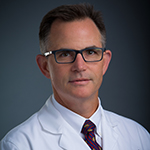 Mariana Chavez, M.D., a fifth-year general surgery resident at the Mexico City Nutricion hospital just finished her eight-week observership at UAB and said the observership program has been immensely beneficial to residents like her.
Mariana Chavez, M.D., a fifth-year general surgery resident at the Mexico City Nutricion hospital just finished her eight-week observership at UAB and said the observership program has been immensely beneficial to residents like her.
For nearly 30 years, the UAB Department of Surgery has fostered an observership program in which fifth-year residents from the Instituto Nacional de Ciencias Medicas y Nutricion in Mexico City, Mexico, come to UAB in order to experience what it’s like to work at an international institution.
Mariana Chavez, M.D., a fifth-year general surgery resident at the Mexico City Nutricion hospital just finished her eight-week observership at UAB and said this tradition has been immensely beneficial to residents like her.
“Coming here gives us the opportunity to see how surgery is practiced in a very different context from ours and allows us to expand our experience in the field,” Chavez said. “Participating in the different clinical and academic activities as observers in the operating room, in the clinic, in talks and in conferences allows us to expand our knowledge and helps us to consolidate our decision-making criteria in our future practice.”
The tradition began when former UAB Department of Surgery Vice Chair Joaquin Aldrete, M.D., and former chair of the Department of Surgery at the Mexico City Nutricion hospital Héctor Orozco, M.D., who were friends and colleagues, decided to start a program that would give the Mexican residents the opportunity to complete an observership at UAB.
A few years later, the first group of these residents traveled to Birmingham to complete their training in a number of different areas: surgical oncology, liver and pancreas surgery, kidney and liver transplant surgery, vascular surgery and plastic surgery. Now, those residents work as attendings at the Instituto Nacional de Ciencias Medicas y Nutricion, and the hospital boasts successful hepatopancreatobiliary, surgical oncology and transplantation divisions that were started and are led by those residents who trained at UAB.
“Some of our divisions were founded with the teachings that were acquired in this hospital many years ago, so coming here has always been an enriching experience in our training,” Chavez said. “In the end, I think that seeing surgery from a different perspective opens up the panorama as a specialist.”
 Dr. Martin Heslin
Dr. Martin Heslin
The Division of Surgical Oncology’s Martin Heslin, M.D., the medical director and course director for the program, said the program is beneficial to residents from both the Mexico City Nutricion hospital and UAB Hospital.
“This program allows chief residents from the nutrition hospital in Mexico to experience the breadth and diversity of tertiary care in the United States and allows our residents to develop international relationships with surgeons from other countries where they may have a different approach to surgical management,” Heslin said.
Both Chavez and Heslin cited UAB’s high case volume as one of the most important aspects of the residents’ experience here.
“The excellent international reputation of the UAB Department of Surgery is well known,” Chavez said. “Because it is the third-largest public hospital in the country and has one of the largest surgery departments, the high number of cases and the complexity of those cases are hardly comparable to other hospitals. Since the UAB Department of Surgery has many divisions, the variety of cases to which we can be exposed is extraordinary and gives us the opportunity to choose the cases in which we are most interested, either by the cases’ complexity or infrequency, or simply because we are interested in that area of surgery.”
Heslin agreed that case volume and flexibility are some of the program’s biggest selling points.
“When they’re here, they can concentrate on the areas they are interested in,” Heslin said. “The curriculum flexibility, high case volume and tertiary medical care international residents experience here makes this program very beneficial. It allows these residents to see just how high-volume surgery works. Additionally, working with many physicians in clinic expands their understanding of the workup and outpatient management prior to consideration of an operation.”
Going forward, the Robert E. Reed Gastrointestinal Oncology Research Foundation will be the primary sponsor of this program through its generous annual contribution to the UAB Department of Surgery. The Reed Foundation also supports young, promising surgeon scientists through career development and specific grant awards.